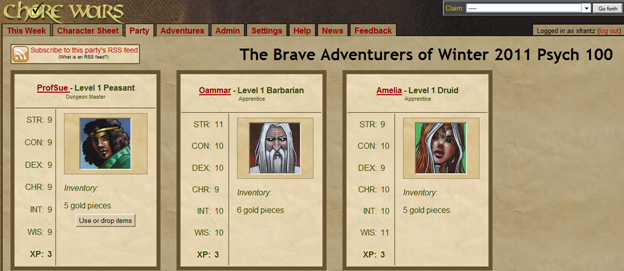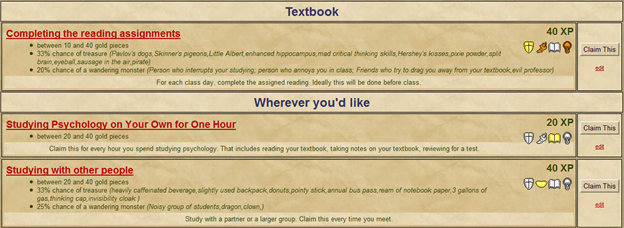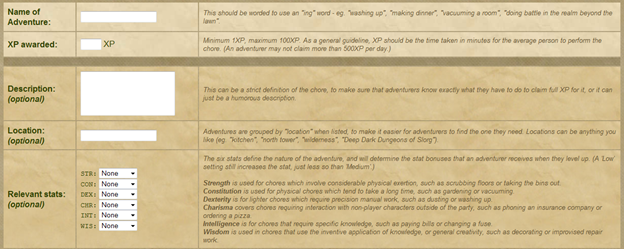Having played my share of games like World of Warcraft and Diablo, I’ve been fascinated by the built-in reinforcement of achieving experience points, gaining status by leveling up, acquiring better weapons and armor, and finding treasure. I’ve toyed with the idea of structuring my class in a similar way. My class is point-based, so it’s easy enough to see how that could work. After earning so many points, a student levels up. After completing certain tasks, the student can roll a die for treasure.
But that has always felt like one of those 3am ideas. You know, the ones that you have in the middle of the night that just feels like absolute brilliance, but by the light of day you think, “That’s the most ridiculous idea I’ve ever had.”
And then I read an article in the NY Times, “On a Hunt for What Makes Gamers Keep Gaming.” The article asks, “Why are these virtual worlds so much more absorbing than school and work? How could these gamers’ labors be used to solve real-world puzzles? Why can’t life be more like a video game?” The answer is as simple as operant conditioning, “Players get steady rewards for little achievements as they amass points and progress to higher levels, with the challenges becoming harder as their skill increases.” Tom Chatfield, author of Fun Inc.: Why Gaming Will Dominate the Twenty-First Century, is quoted as saying, “One of the most profound transformations we can learn from games is how to turn the sense that someone has ‘failed’ into the sense that they ‘haven’t succeeded yet.”
Is a test the only opportunity a student has to show that they know the material? Is it a one-time thing, or does the student get multiple opportunities to try? I think about any video game I’ve played, going all the way back to Donkey Kong. I didn’t get just one chance to master a level. I had 3 lives. And if that didn’t do it, there were always more quarters. In my course, there are 2 chances with tests. If you don’t do well on the first test, but do better on the comprehensive final, the final can replace it. It’s a mastery approach, but not by much. I’m convinced there’s a better way, but I haven’t found it yet.
But this blog is about technology. The NY Times article mentions a (free) game called ChoreWars. You set up your party, say your family, and you identify a number of chores, say vacuuming, dusting, washing dishes. To each chore, you assign experience points, the amount of virtual gold that could be earned, the chance of getting treasure and what that treasure might be, and the chance of running into monsters you then have to battle. As you accumulate more points, your character levels up. The virtual gold can be exchanged for real-life rewards. For instance, 100 gold pieces could be exchanged for the right to go to a movie.
But this blog is also about education. I used ChoreWars to create a game for my students. Instead of chores, students earn points, virtual gold, and the chance to win virtual treasure by completing school-related tasks, e.g., attending class, doing the reading assignment, completing the written assignments, meeting with a study group, studying on their own. I told them that playing was completely voluntary, but if it sounded fun to them and they decided to play, I’d play, too. So far I have a couple students who opted to join; we’ll see if they decide to stay with it.
Here are the members of my party.

Clicking the “Adventures” tab takes me to this page. Here are 3 of the tasks. Every time students complete the reading assignment, they click the ‘claim this’ button. They earn 40 experience points, are randomly given between 10 and 40 pieces of gold. They have a 1/3 chance of earning treasure and a 1/5 chance of encountering a monster. As dungeon master, I created the treasures and monsters.

The interface is intuitive. To add a new adventure, click the ‘new adventure’ button at the top of the adventures page. That generates this form.
Name your adventure, put in how many experience points the adventure is worth. Add a description and a location if you’d like. If you add a location, all of the adventures with that same location will be clustered together on the adventures page. Change the relevant stats. When a member of your party claims the adventure, their character’s attributes will increase. Changing the stats for a particular adventure will determine how many points their character’s attributes will increase. For example, for “studying with other people,” I set constitution at medium (takes energy to meet with a group), charisma at high (requires a lot of interaction), intelligence at medium (you have to know stuff), and wisdom at medium (you have to be able to find ways to explain stuff to others).

Enter the amount of gold that can be earned, the percent chance of earning treasure, what those treasures are, the chance of encountering a wandering monster, and who those monsters are. The “adventure status” defaults to active, but you can also ‘retire’ it (say, if an assignment due date has passed), or set it as a quest. A quest is something that only one person can do. Once someone claims a quest, it becomes inactive for everyone else.

I’m going to play with it this quarter to see what it’s like. But I can envision tying real-life rewards to something like virtual gold, something low-stakes, but motivating. For example, I offer a number of extra credit opportunities in my course, but students can only earn a maximum of 7 extra credit points. Perhaps students could trade in 200 gold pieces for the opportunity to earn an additional extra credit point with a maximum of an additional 5 that could be earned, or some such thing. Since ChoreWars operates on the honor system, I don’t want to give students too much incentive to say they’re doing something when they’re actually not.
If you try it out with your students, let me know how it works for you!

